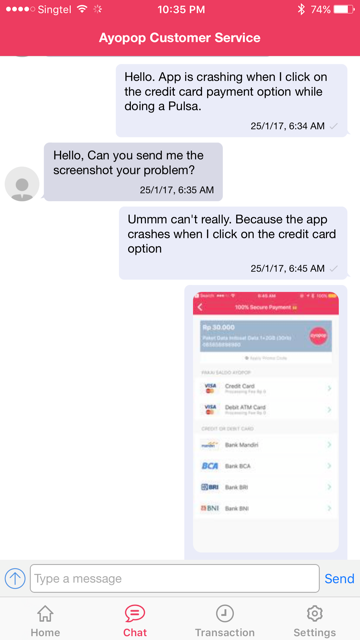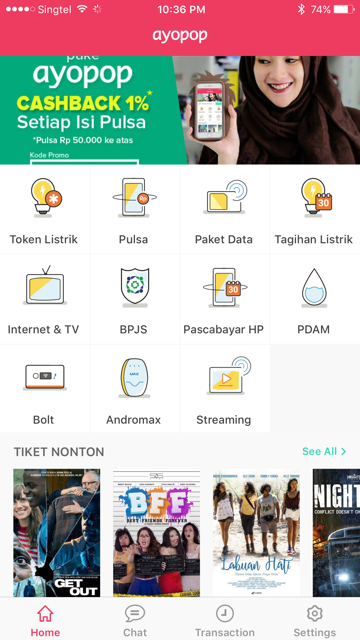Building Customer Trust
Our fund’s investment thesis for Ayopop
Our fund’s investment thesis for Ayopop

I have been waiting for this since I started writing the blog: a portfolio company of mine releasing funding news so that I can write about the big problems they are going after and what great work they are doing. But lately we have been hearing this more and more: “Let’s roll out this particular feature and then we’ll do an announcement”, “We need to fix our backend first before we can handle the volume”, and so on. What’s up with founders not wanting to release funding news these days?
At long last, one of our portfolio companies, Ayopop, released their funding news this week. And hence it’s the best time for me to share a bit about how VC decisioning is made in light of this news.
For Seed stage, as you’ll often hear, it all starts with the Team. But what about the team? What in the Ayopop team convinced us of picking them out in such a competitive industry?
Starting with Jakob Rost. After working with pedigree institutions such as BCG and JP Morgan, Jakob moved to Lazada and setup their marketplace in Indonesia moving on to become the CCO for the cross-border marketplace. There is an internal joke we have that he is the only one we know of who ended up staying in Lazada for more than 3 years. With this sort of background, we feel confident that the commercials of the company will be in good hands, and Jakob is probably one of the best experienced professional in Indonesia to solve this problem.
Moving on to Chiragh Kirpalani. An Indonesian who spent part of his career in India, he has the rare combination of possesing cultural know-how of Indonesia along with founding and execution experience of consumer tech businesses in India. It further helps that he is a Serial entrepreneur having founded and exited a business. Starting his career as a designer in Fab.com, Chiragh started an internet venture called Gawbl in Pune. An acquisition by Times Internet later, he went on to become the Head of Product at Times Internet. A few years in he found his homeland calling him back, and thus started his journey with Ayopop.
The combination of Chiragh’s design and product experience with Jakob’s commercial and operations experience is a rare combination to find in Indonesia. It helps even more that the company is enjoying tech arbitrage by having its tech team in India. All in all, we are certain that there is no better team in the early stage ventures in Indonesia solving digital payments and this is a big enough confidence inducing factor in any VC.
Moving on to the problem at hand. There is no dirth of facts that Indonesians do not like using cards for online payments. While the eCommerce industry has boomed rapidly the most preferred payment method is still Bank Transfers in Indonesia. Here are some statistics from Macquarie on the same, and even though this is not recent (our Ayopop investment was done last year), I am positive that the numbers have not really changed.

This is a huge deterrent for most eCommerce companies, including transport companies such as Go-Jek, Grab, and Uber. No wonder that most of these companies are jumping into digital wallets to be able to serve their customers better. But unfortunately the buck stops there for the incumbents. As long as Go-Jek gets its users to transact online through its wallets, they’ll likely be happy with the status quo, just like the banks have been happy with bank transfers and internet banking as the payment channel.
Clearly this is a big enough problem to solve. And efforts such as T-Cash, Mandiri Pay, and even Go-Pay are all trying to solve this problem. But the underlying problem still hasn’t been solved by any of these solutions.
Enter Ayopop.
After spending some time trying to understand the market, we understood that the lack of payments through credit cards or digital solutions boils down to two reasons:
1. Lack of Trust
No solution in Indonesia has built trust when it comes to payments. Banks and Telcos already do not enjoy customer trust when it comes to e-money. If they did people, would be applying for credit cards and using internet transfers more than ATM transfers. Ayopop is trying to solve this from day one. The easiest way to do this using the product was to enable 24x7 in-app chat for customer support. No need to call pesky toll-free numbers. No more emails. Just ping the chat and a CS executive attends to you instantly. And this works brilliantly.

2. Inertia
No company has yet managed to figure out a way to get over the customer’s inertia. A new product needs to solve a big enough problem to overcome this inertia of the consumer. And big problems are usually around basic needs. For any consumer facing business, we always ask ourselves the question, is this a basic need for the consumer. As the markets we are operating in are so far behind mature economies, the only way to ensure that a company remains relevant is by ensuring that they take care of a basic human need. And for markets like Indonesia, smartphone access is a basic need. So is paying their utility bills to make sure that the electricity keeps running and the water keeps flowing. Spas, beauty services, and even food delivery can come later. But when you run out of Pulsa, you stop everything you were doing and go to a vendor for a top-up.

Clearly we saw a good product market fit in Ayopop. But there was one concern still, the business model. Utility payments and bill payments are infamous for their low margins. Add to this the customer acquisition cost, and the unit economics start making sense only at massive scale. This was a worrying factor, and we spent a fair bit of time understanding this. After careful unit economics cost assumptions and calculations, similar to what I have stated in my previous post, we understood that there is still a way to make a business out of this, and have only been convinced in our decision with the metrics the company has shown lately.
Jakob and Chiragh are shrewd entrepreneurs. They try to juice out every cent from a transaction. Their love for NMV over GMV, no-discounts policy, and persistence in maintaining positive unit economics will endear any investor to them. While the business still runs on razor thin margins, at scale we see the company breaking even easily, and more. One thing that I am particularly excited about is the data that the company is able to gather on every consumer and the amazing retention it has been able to enjoy from its consumers. It paves the way for cross-selling future products (fintech or otherwise) within the ecosystem and getting a bigger share of the user’s wallet (literally). The more the financial and payment products available on the platform, the bigger the margins that the company can generate. This is why backing a standalone fintech company digging deep into the digital payments ecosystem makes sense to us.
While there were many more factors we considered, it will be a long night if I mention all of them here. In the end what really excited us was how easy it was to work with the team. The responsiveness, the maturity and the love for their work that we see in these founders is rare to come by. To this date, Jakob and Chiragh respond to me within 5 seconds of a Whatsapp message. They are diligent, respectful, flexible, and open to feedback. But in the end, they go and execute the business their way, and do a wonderful job of growing the team and the business every month. And this is why Venture Capital is the best job on earth, as put by my partner: “You get to choose who you want to work with”.
